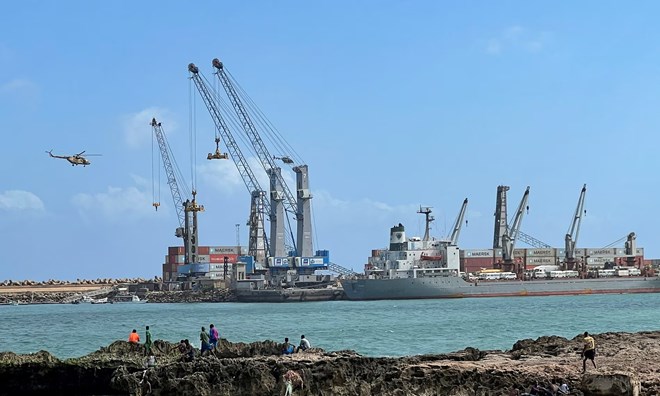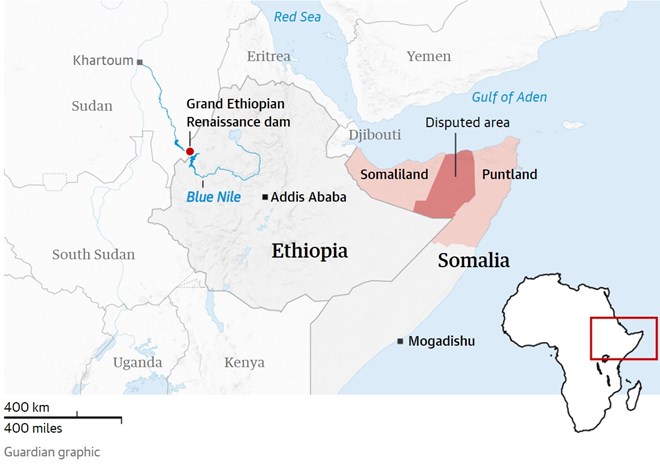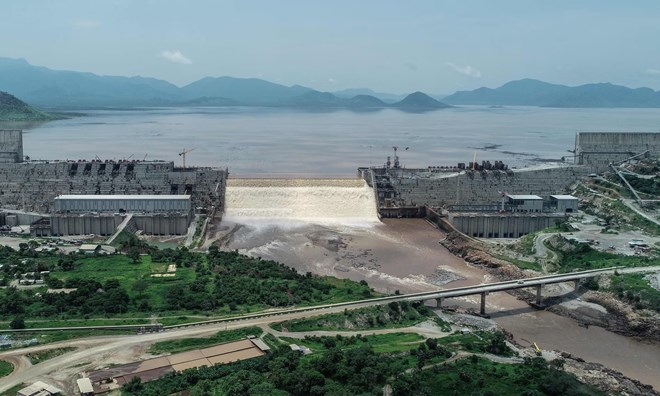
Wednesday September 25, 2024
By Faisal Ali
Ethiopia fears weapons could worsen security situation amid regional rows over water, territory and Red Sea access
Security helicopters hover above Mogadishu sea port after an Egyptian warship docked to deliver a second major cache of weaponry. Photograph: Feisal Omar/Reuters
Egypt has sent a second arms shipment to Somalia’s federal government in the space of a month, drawing criticism from its longstanding rival Ethiopia, amid concern about rising tensions in the Horn of Africa.
Egypt’s foreign ministry confirmed that a shipment had been sent, which it said was intended to “build the capabilities of the Somali army” to “achieve security and stability, combat terrorism, and uphold its sovereignty, unity, and territorial integrity”.
In a post on X, Somalia’s state minister for foreign affairs, Ali Omar said: “Surprised to see Ethiopia raising concerns over Somalia receiving arms to defend its sovereignty and combat terror.”
Egypt has been locked in a long-running dispute with Ethiopia over the latter’s construction of a major dam on the Blue Nile, which provides 95% of its fresh water. Somalia has meanwhile fallen out with Ethiopia over a memorandum Ethiopia signed with the breakaway region of Somaliland to lease a portion of its coast, describing it as an attempt to “annex” its territory.
The two issues, previously separate, have bled into each other as Egypt and Somalia increasingly coordinate their efforts against Ethiopia over their respective water disputes.
“These are all states which are fiscally at their limit,” said Harry Verhoeven, an expert on infrastructure and energy in the Horn of Africa. He added that the posturing carried a risk that things could get out of hand in a region already struggling with multiple conflicts. “Politicians know the fires they start and they can’t always control them.”
More than 20 million people are already internally displaced across east Africa, according to the International Migration Organisation, owing to conflict and extreme weather.
In a statement posted on X, Somaliland, which has governed itself since it declared independence from Somalia in 1991, warned that the weapons deliveries risked triggering an “arms race” that could jeopardise regional security.

Somaliland and Ethiopia signed a memorandum of understanding in January that has upended the region’s fragile status quo. The full details of what was agreed remain murky, causing one western diplomat to dub it a “memorandum of misunderstanding”, but Somaliland has said Ethiopia would become the first country to recognise its independence, while Ethiopia would be granted sea access on its coast.
Ethiopia became landlocked in the early 1990s when Eritrean rebels declared independence in the north and has long sought alternative routes through other coastal neighbours.
The pact could set the stage for Addis Ababa to re-emerge as a maritime power in the future as Houthi attacks on Israeli and American ships in the Red Sea highlight the dangers of over-reliance on Djibouti, which carries virtually all of Ethiopia’s international trade.
The deal has infuriated officials in Mogadishu, who fear it could cut the country in two and provide Ethiopia a permanent naval base on its territory.
Speaking at a conference earlier this month, Ethiopia’s intelligence chief, Redwan Hussien, confirmed Somali fears when he said Ethiopia was not only seeking commercial access to ports and lamented previous episodes in Ethiopian history when the country failed to stake a claim to the Horn of Africa’s coast. “Now is the right time to fulfil it and have access to the sea,” he said.
Somalia initially opted for diplomatic means to thwart the deal but has dialled up the rhetoric and hardened its position over the summer.
In an audience Q&A on a local news channel this month, Somalia’s foreign minister, Ahmed Moalim Fiqi, said his government would consider supporting rebels fighting Ethiopia if it implemented the deal. “We have not reached that stage, there is a hope there will be a solution. But it is a path open to us,” Fiqi said.
Somalia has also drawn Egypt into the standoff. It fears that Ethiopia’s Grand Ethiopian Renaissance dam (Gerd) along the Blue Nile, the largest hydroelectric dam in Africa, threatens its water security.

The Grand Ethiopian Renaissance Dam on the Blue Nile River in Guba, north-west Ethiopia. Photograph: Yirga Mengistu/Adwa Pictures/AFP/Getty Images
Attempts by Egypt and Ethiopia to reach an agreement have failed and in a letter to the UN security council, Egypt’s foreign minister, Badr Abdelatty, said Ethiopia had used negotiations as a cover and that Egypt would take its own measures to preserve its interests.
The military pact agreed between Cairo and Mogadishu, signed in mid-August, has paved the way for Egypt to join the UN-backed African Union peacekeeping mission in Somalia’s fight against the al-Qaida-affiliated al-Shabaab group. The mandate for the African Union transition mission in Somalia is set to expire at the end of this year, and Egypt has muscled in to create a role for itself in its successor, the AU support and stabilisation mission in Somalia.
The deepening cooperation between Cairo and Mogadishu has rattled officials in Ethiopia, who have been careful not to name Egypt in their public statements but have frequently referred to “external actors aiming to destabilise the region”.
In January, after the visit to Cairo of the Somali president, Hassan Sheikh Mohamud, first visit of the year to Cairo, Redwan, Ethiopia’s intelligence director, appealed to his Somali counterparts, warning that Egypt’s motivation in Somalia was “not amity towards Somalia but animosity towards Ethiopia”.
Redwan added that Ethiopia had demonstrated its commitment to Somalia’s security through the “blood and sweat” of its troops, which have been deployed to Somalia on a bilateral basis and with AU peacekeeping forces for over a decade against al-Shabaab.
The memorandum between Ethiopia and Somaliland has been met with widespread international criticism, with the Arab League, the European Union and most recently the US expressing their objections.
Abiy Ahmed, Ethiopia’s prime minister, has addressed the issues of sea access and the use of the Nile in existential terms for his country and views both projects as linchpins of his plans to drive growth in Ethiopia and turn it into a manufacturing power.
External attempts to diffuse the situation have failed to deliver a breakthrough. In late August, Djibouti’s foreign minister, Mohamud Ali Youssouf, said in an interview with Voice of America that his country offered Ethiopia commercial access to another port along its coast but not military access and was still waiting for a response.
Two rounds of indirect talks in Ankara mediated by Turkey, which has strong ties to both governments, have also failed to bear fruit. Somalia has demanded that Ethiopia rescind the memorandum before direct talks can take place.